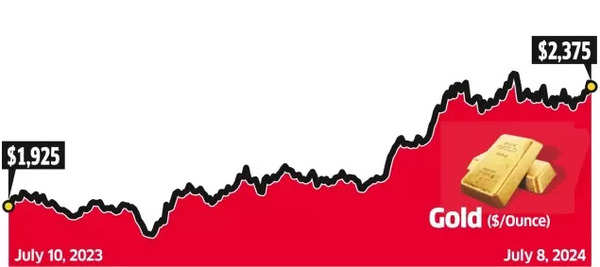- News
- Business News
- India Business News
- Gold shines! RBI adds $5.6 billion in gold reserves in April-June quarter; value of reserve gold up $3.8 billion
Trending
Gold shines! RBI adds $5.6 billion in gold reserves in April-June quarter; value of reserve gold up $3.8 billion
Data from the RBI indicates that the bank bought around nine tonnes of gold between the end of March and the end of May. The per tonne value of gold increased from $63.44 million per tonne at the end of March 2024 to $68 million at the end of May.

RBI is among the top three central banks to accumulate gold in the first quarter of the calendar year. (AI image)
India’s Forex Reserves: The Reserve Bank of India (RBI) saw a significant increase in its gold reserves during the April-June quarter, accounting for 69 percent of the total reserves pile-up. The central bank benefited from both increased gold purchases and valuation gains due to rising prices.
Data from the RBI indicates that the bank bought around nine tonnes of gold between the end of March and the end of May.The per tonne value of gold increased from $63.44 million per tonne at the end of March 2024 to $68 million at the end of May. The World Gold Council attributes the global price rally in gold prices to the demand from central banks, which in turn helps them achieve valuation gains.
According to the latest RBI data cited by ET, the central bank added $5.6 billion to its stock of reserves in the June quarter, with foreign currency assets rising by $1.9 billion and the value of gold in reserves increasing by $3.8 billion. As of June 28, India's foreign currency reserves stand at $652 billion.

According to World Gold Council data, the Reserve Bank of India is among the top three central banks to accumulate gold in the first quarter of the calendar year, with only Turkey and China's central banks buying more gold than India.
Also Read | Why RBI is stocking up aggressively on gold reserves; central bank buys 1.5 times more gold in Jan-April than entire 2023
Central banks worldwide have been actively accumulating gold more aggressively since the start of the Russia-Ukraine war in February 2022, and the RBI has followed this global trend. Additionally, the RBI is gradually moving physical gold purchased overseas back to India, likely as a precautionary measure in response to escalating geopolitical tensions in the northern hemisphere.
The World Gold Council noted in its recent report, "In what was an interesting quarter for the gold market, central banks made clear their commitment to the longstanding trend of gold buying. While the recent price rally may have impacted trade execution, for those central banks that manage their gold reserves more actively, we do not expect it will derail any strategic gold accumulation plans they may have."
The Reserve Bank of India has been actively accumulating gold as part of its reserves management strategy since December 2017, but it has become more aggressive in its purchases post-COVID.
Data from the RBI indicates that the bank bought around nine tonnes of gold between the end of March and the end of May.The per tonne value of gold increased from $63.44 million per tonne at the end of March 2024 to $68 million at the end of May. The World Gold Council attributes the global price rally in gold prices to the demand from central banks, which in turn helps them achieve valuation gains.
According to the latest RBI data cited by ET, the central bank added $5.6 billion to its stock of reserves in the June quarter, with foreign currency assets rising by $1.9 billion and the value of gold in reserves increasing by $3.8 billion. As of June 28, India's foreign currency reserves stand at $652 billion.

Gold Price Movement
RBI Governor Shaktikanta Das had said in a post-policy media conference on April 5, "We are building up gold reserves, the data is released from time-to-time." He added, "All aspects while building up the reserves are assessed and then we make a decision." The central bank's primary objective in holding gold reserves is to diversify its foreign currency assets base and hedge against inflation and foreign currency risks.
According to World Gold Council data, the Reserve Bank of India is among the top three central banks to accumulate gold in the first quarter of the calendar year, with only Turkey and China's central banks buying more gold than India.
Also Read | Why RBI is stocking up aggressively on gold reserves; central bank buys 1.5 times more gold in Jan-April than entire 2023
Central banks worldwide have been actively accumulating gold more aggressively since the start of the Russia-Ukraine war in February 2022, and the RBI has followed this global trend. Additionally, the RBI is gradually moving physical gold purchased overseas back to India, likely as a precautionary measure in response to escalating geopolitical tensions in the northern hemisphere.
The World Gold Council noted in its recent report, "In what was an interesting quarter for the gold market, central banks made clear their commitment to the longstanding trend of gold buying. While the recent price rally may have impacted trade execution, for those central banks that manage their gold reserves more actively, we do not expect it will derail any strategic gold accumulation plans they may have."
The Reserve Bank of India has been actively accumulating gold as part of its reserves management strategy since December 2017, but it has become more aggressive in its purchases post-COVID.
End of Article
FOLLOW US ON SOCIAL MEDIA
















